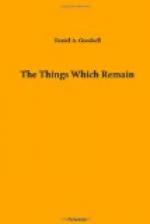[Sidenote: Man Above Brutes.]
[Sidenote: Habits of Animals.]
[Sidenote: Limits of Brute Intelligence.]
[Sidenote: Limits Continued.]
But when all this is said, man rises almost infinitely beyond the highest brute. Man can stand outside of himself; contemplate the movements of his own mind; watch the play of motive upon energy and will, and know himself as no brute can ever be trained to do. Nor have brutes the ganglia, lobes, or convolutions which house and direct such powers; and no tribe of mankind has been found without them, however undeveloped. Very limited, indeed, is the use of natural forces or of supplied materials in the life of a brute. The birds pick up feathers, hair, twigs; but no bird provides such things by deliberate prevision and co-operation with nature. What animal sows that he may reap? The so-called agricultural ants gather what they have not sown, and reap what they have not planted. Man sows that he may gather; breeds that he may use; and accomplishes civilization by an ever-increasing mastery and adaptation of natural forces. An insect may float with the current on a chip; but what one ever put a chip into the water? A beaver may build a dam; but what beaver ever turned the heightened water on a wheel? The dog may lie in a sunny spot; but what dog ever created artificial heat or condensed by a lens the sun’s heat on a particular point? The hen may lay and incubate an egg; but what hen ever invented an incubator to save her long sitting in one pose or place, or studied the development of life in and from the egg she produced? The ox may select the richest pasture; but never dreamed of creating a rich pasture by the culture and fertilization of which he is the chief source. The tiger chooses and slays his prey; but does not know how to propagate, develop, and safely mature the animals on which he feeds. All animal life below man must locate where its food abounds, or follow that food in its migrations or seasonal changes. Man alone stores and transports his food, creating commerce by his mastery of climate.
[Sidenote: Man Parts Company.]
[Sidenote: Man and Brute Compared.]
[Sidenote: How Man Can Live.]
[Sidenote: How Man Can Decay.]
[Sidenote: Incidental as to Body.]
The brute obeys law unwittingly in the sustenance and transmission of life. Man alone perceives and deduces law from a thousand facts, and concludes a lawgiver from the law, and one Lord and Giver of Life “from the unity and universality of force.” The brute turns its eye skyward to detect danger; but never measures or counts the stars, discerns the movements of the planets, nor extends vision and hearing by telescope, microscope, and megaphone, nor proves by the spectroscope the sameness of stellar elements with those of our own world. The brute neither makes history nor records it. He remembers, but does not recollect. His affections are evanescent




